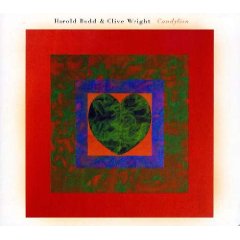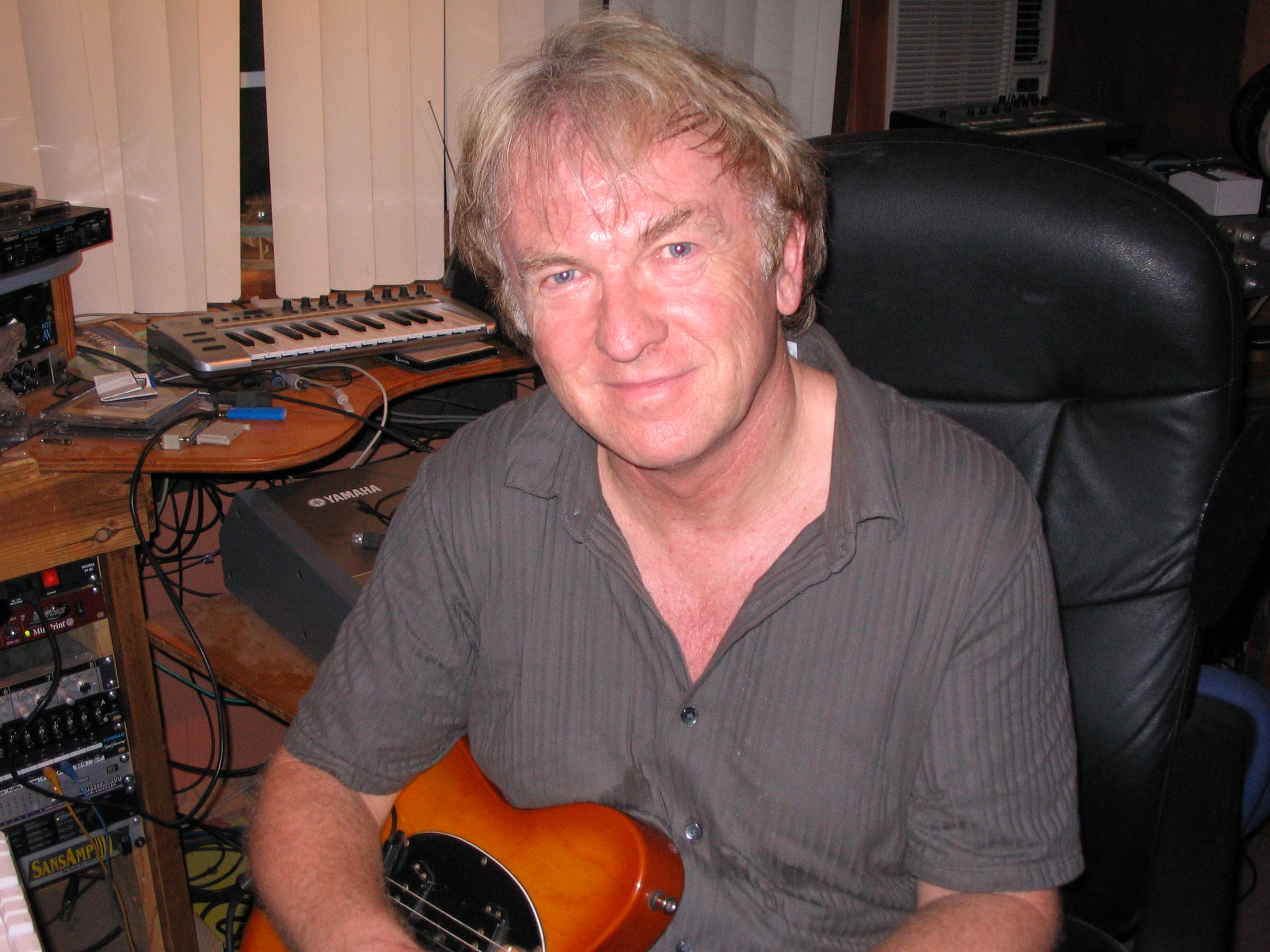Podcast: Play in new window | Download
Subscribe: RSS
Harold Budd & Clive Wright: Strangers in the Ambient Night
You can get the Podcast of this interview with music here.
Clive Wright and Harold Budd couldn’t be more different. Born in 1936, Harold Budd is elegant, and thoughtful. He looks like he just got off the golf course and is nursing his second martini on the veranda, contemplating the sunset. Clive Wright on the other hand is all nervous, top of the mind energy. Born in England in 1953, he’s sweating in the summer heat of the Joshua Tree desert a few hours southeast of Los Angeles, offering me a beer.

Harold Budd @ Echoes Concert
Harold Budd is the author of 35 years worth of pensive ambient chamber music full of open spaces.
Harold Budd: My idea of working in the studio is to play as very little as possible, and take what you got and then work with that.
Clive Wright is still a journeyman musician, best known as the guitarist with a pop group called Cock Robin.
Clive Wright in Studio
Clive Wright: Yes, I know, it really throws a curve ball to a lot of critics. They see Cock Robin and they see Montell Jordan and even the Black Eyed Peas. I actually did a lot of R&B stuff in the ‘90s.
But somehow these two musicians got together to make a pair of ambient albums, A Song of Lost Blossoms and Candylion. They met when Harold moved out to Joshua Tree in 2004. Neither musician had ever heard of the other.
Harold Budd: Not at all, not at all. He told me he had been with Cock Robin which meant nothing to me. I never heard of Cock Robin and in fact I still don’t. I still don’t know anything about them.
Clive Wright: I didn’t even know who Harold was until Carl [Roessler] actually played a type of Harold playing a Daniel Lanois’ Party. It was just like acoustic piano. It wasn’t Harold at his best, I think Harold would admit that. I just kept listening to the thing, “Well, what was the big fuss about this guy?” I mean, I just really didn’t get it at that time. Later on, of course, I heard his work with Brian Eno, I was just absolutely astounded.
Clive Wright wasn’t a stranger to ambient music. He’d formed a group with native flute and didgeridoo player Carl Roessler called Spiral Ascension. They released a prototypically ambient album called Earth, Sea and Sky.
 The very first piece Harold Budd and Clive Wright worked on became the 30 minute opening track of A Song of Lost Blossoms. Called “Pensive Aphrodite,” it’s a pure improvisation for electric guitar and keyboard. Harold says they didn’t establish any parameters, including key signature, before playing.
The very first piece Harold Budd and Clive Wright worked on became the 30 minute opening track of A Song of Lost Blossoms. Called “Pensive Aphrodite,” it’s a pure improvisation for electric guitar and keyboard. Harold says they didn’t establish any parameters, including key signature, before playing.
Harold Budd: Not a thing. I think probably the key I chose because it’s the first sound you hear. [laughs]
Clive Wright:”Pensive Aphrodite” is a performance because it was actually recorded straight to a two-track. We ended up recording it straight to CD. It was like one of those cuts, it just goes straight to a recording CD player.
Sitting at a piano at Knobworld Studios in the Echo Park section of Los Angeles, Harold Budd opens up a small notebook.
Harold Budd: I always have a notebook with me. I write down song titles the way that I sketch out poetry ideas, or something like that, yeah.
It’s those song titles that often yield the kernal of a composition.
Clive Wright: Harold is a master of titles, he writes titles. Before the piece is even written, and sometimes, it’s not assigned to that piece, and the same thing happened with “Blossoms.” He writes the title and he throws them at me on an email. I’m looking at the email and I’m thinking, “There’s no way.” (laughs) No way that’s going to work, you know.
Their second album, Candylion, released in the middle of 2009, is different. Budd was living in Pasadena while Wright remained in Joshua Tree.
Harold Budd: Well, yes it is different in that there’s no time ever that we play together. I would lay a groundwork or a mood or something. Something that really attracted me, I would put it down in order.
Clive Wright: He insisted on the sequencing of the tracks be as we recorded them. He won’t allow me to shuffle them up.
Harold Budd: Candylion is sequenced in order of recording, which is a very — I don’t say important thing for me — but I think about, “Well, what should be next” and that usually determines what is next as a matter of fact.
It’s unclear whether Clive Wright and Harold Budd will record together again. They don’t even necessarily agree on the concept of their albums. Sitting in his studio, surrounded by a jumble of guitars and electronic gear, Clive Wright feels they are in the midst of a trilogy.
Clive Wright: Candylion was conceived by Harold Budd as a second album in a triptych , a desert triptych . So, thematically, it’s about the desert.
Harold Budd: I don’t really think so. They are not. They have nothing to do with the landscape. I don’t feel wedded to the landscape that way. That faux romance of the western deserts, I don’t buy it.
While Harold Budd and Clive Wright contemplate their future collaborations together, you can hear their two albums, Candylion and A Song of Lost Blossoms, both on Darla Records.
Listen to Echoes Podcast of this Interview.
John Diliberto ((( echoes )))
Further Reading/Listening
Review of Harold Budd & Clive Wright’s A Song of Lost Blossoms
Review of Harold Budd & Robin Guthrie’s: After the Night Falls and Before the Day Breaks



I love this band, their music is so mythic.
For the information you can coproduce their new album on kisskissbankbank website.
If you want more informations check this video.
Enjoy !!!